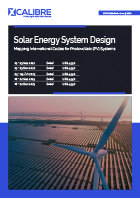| Date | Venue | Fee | |
|---|---|---|---|
| 01 Jun - 05 Jun 2026 | Dubai – UAE | $ 5,950 | Register Now |
| 14 Sep - 18 Sep 2026 | Dubai – UAE | $ 5,950 | Register Now |
| 14 Dec - 18 Dec 2026 | Dubai – UAE | $ 5,950 | Register Now |
About the Course
The vast majority of worldwide new power generation facilities are based on green resources. These resources include various types of renewable resources, especially solar and wind energies.
This Solar Photovoltaic System Design training course focuses on the power production from solar energy that utilises photovoltaic technologies. It presents the basics and advances of solar PV technologies and systems. It starts from the basics of energy and fabrication and then covers the primary theoretical and practical methods for successfully implementing solar PV systems for electric energy production. Various modes of operation (off-grid and grid-connected), load types (non-deferrable and deferrable), and system configurations are well covered. Likewise, it provides several case studies and the use of computer software for modelling, performance analysis, and sizing of various solar PV configurations.
It will be coupled with relevant numerical examples to demonstrate the use of international online software modules, the given mathematical models, and the System Advisor Model (SAM). Applicable standards are considered in the sizing process. The overall outcome is facilitating the delegates with the required knowledge, skills, and tools for successfully designing and implementing various solar PV systems and project management and consultation.
Core Objectives
The delegates will achieve the following objectives:
- Describe various energy sources and describe the fabrication process of solar PV cells
- Know the functions of various assemblies and subassemblies comprising solar PV systems considering multiple modes of operation
- Understand the requirements and validity of the simplified assumptions for fast analysis of the performance of solar PV systems and evaluate the performance of various solar PV systems
- Select appropriate solar PV topologies for various operation modes, and load types
- Acquire the quantitative characterisations of various generations of solar PV technologies
- Learn the near-optimal design of various configurations of solar PV systems
- Use of software tools for design and performance analysis of solar PV systems
- Understand the fundamentals of project management and consultancy requirements
Training Approach
The delegates will be taught through learning techniques that ensure maximum understanding, comprehension, and retention of the information presented. The training methods will vary depending on their needs, from front-end to blended learning. It is divided through Information receiving, participation, and Learning by Doing to provide the highest level of apprehension and retention of the presented material. They will be working on case studies and doing a hands-on project, and at the end of the training course, they will be assessed to determine the level of knowledge they have retained.
The Attendees
This training course is multi-discipline in nature and suitable for many specialisations. It deals with solar (photovoltaic) energy systems from the fundamentals of solar cells and their characteristics and selection. In addition, it presents advanced topics such as the sizing of photovoltaic systems.
Likewise, it will be valuable to the professionals but not limited to the following:
- Renewable Energy
- Sustainable Energy Specialists
- Energy and Power Professionals
- Mechanical Engineers and Electrical Engineers in the Energy and Power Industry
Daily Discussion
DAY ONE: ENERGY SOURCES AND ENERGY TECHNOLOGIES
- Overview
- Energy Resources
- Energy Technologies
- Major Challenges in Energy
- Matching technologies to various resources
DAY TWO: FUNDAMENTALS OF PHOTOVOLTAIC TECHNOLOGIES
- Solar Photovoltaic (PV) Technological Generations
- PV Module (Panel) and Array
- Fabrication of Solar Cells
- Quantitative Characterisation of Solar Photovoltaic (PV) Technologies
- Selection criteria of Solar Photovoltaic (PV) Technologies for various applications
DAY THREE: POWER GENERATION
- Basic Scheme of Solar Photovoltaic (PV) Generators and Loads
- Generating Plants Connected to the Medium-Voltage Network
- Sun Tracking Mechanisms
- MPPT and DC-DC converters
- PCU and Inverters
- Energy Storage Options
DAY FOUR: ENERGY PRODUCTION AND SIZING
- Simplified Photovoltaic (PV) Energy Production Models
- Validation of the Simplified Models
- Off-grid Systems Supplying Non-deferrable Loads
- Grid-connected Solar Photovoltaic (PV) Systems and Battery Backup
- Solar Photovoltaic (PV) UPS
DAY FIVE: PROJECT MANAGEMENT AND CONSULTANCY
- Definitions
- Stages of Project Management
- Planning and Building a Solar PV Farm
- Project Managers and Consultants
- Functions of Energy Consultants
Certificate Awarded
Upon successful completion of this training course, participants will be awarded a Certificate of Completion from XCalibre Training Centre, acknowledging their accomplishment. This certificate serves as a testament to their dedication to developing their skills and advancing their expertise in their respective fields.



